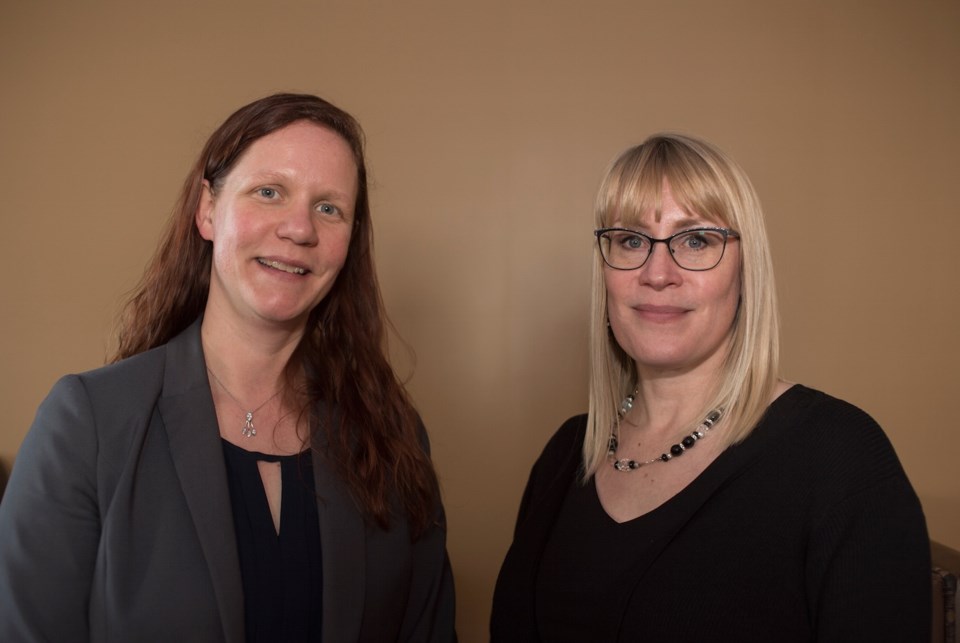Local business owners learned more about the impact of the upcoming legalization of marijuana during a Cannabis 101 seminar Thursday at the Fired-Up Grill.
Many of them were looking for clarification on issues related to their employees being impaired from consuming legal marijuana while on the job. A current discrepancy is some human rights laws allow the consumption of certain drugs for certain reasons in the workplace; this created issues of confusion and frustration of those who attended the workshop from the Estevan business community.
The seminar was hosted by the Estevan Chamber of Commerce, Miller Thompson, MNP and WorkSafe Saskatchewan.
The two main speakers were Amy Groothuis from the Regina based Miller Thomson law firm, and Janice Decelles from MNP, also based in Regina. MNP provided work booklets for people write up a draft drug workplace policy for their business.
Additionally Carolynn Meginbir from the Saskatchewan Workers’ Compensation Board was in attendance. She also contributed to bringing some clarity to the issues associated with impairment in the workplace.
Jackie Wall, the chamber`s executive director, noted that she believes the workshop was very useful for all who attended because it helped in answer questions about marijuana in the workplace.
Groothuis spoke in detail to attendees of the workshop about the complex laws surrounding workplace usage of marijuana.
“I attended today to help employers develop a policy that reflects workplace safety while helping employees know what is excepted of them in terms of legal cannabis use,” said Groothuis. “It is important that employers understand their obligation both from a workplace safety perspective but also from the human rights prospective moving forward with legal marijuana use.
“Human rights in this context have to accommodate any employee who has a dependency on the use of marijuana,” she added.
The biggest issue during the workshop was helping people understand the relation between what appears to be conflicting laws between marijuana usage at work, workplace safety and drug consumption bans that have long existed at many businesses.
“Where an employee has a underlining illness or disability that requires the use of medicinal marijuana, how an employer will respond to that type of request and what the accommodation process might look like in terms of a safety sensitive work environments may require a shift in what someone’s duties are,” said Groothuis.
“Generally speaking it is not going to be legal to consume marijuana by smoking it in public places but other types of marijuana are out there like capsules or gummies. An employer would have a very difficult time accommodating an employee who wanted to smoke outside,” she added.
Groothuis noted that an employee who wants to use marijuana at work recreationally, and does not have medical reason to use the drug, is an entirely different situation than someone who uses it at work for a legitimate medical reason.
“In a situation of recreational usage at work if you are dealing with a person who isn’t using marijuana for a medicinal reason, then it is reasonable for an employer to say that is not acceptable,” said Groothuis.
Groothuis noted that in a medicinal situation, the ability that an employer retains to prevent an employee form working if they consume any amount of marijuana is a very complicated question.
“The accommodation process for an employee using marijuana medicinally is always highly individualized and is different per workplace, but ultimately it is incumbent on an employer to accommodate an employee who needs to use marijuana to the point of undo hardship. What undo hardship is will change from work place to work place,” she said.
The workshop happened due to high demand from people within the Estevan and surrounding area.
“We put on this workshop because we have had so many calls from our membership asking for something like this to take place because this is a huge policy shift that is happing in this country,” said Wall.
“We want to open up dialogue and provide them with the information so they can go back to their workplace, adjust their policies and have that conversation with their workers,” she added.
She believes that the policies businesses already have in place for those types of drugs are easily adaptable to include marijuana and the only real area of some concern is how human rights play a role in that.
Sheila Olson, the safety program director from Estevan Meter Services, was in attendance, and she opposes any form of marijuana usage in the workplace.
“I have three young boys who are getting into oil work themselves and I worry about them all the time. I know they are not going into work impaired but now I have to worry about their co-workers going into work impaired,” said Olson.
“I don’t want some showing up drunk or stoned at work, not knowing what they are doing and one of my kids gets killed as a result. Where are his human rights? It seems everyone has human rights if they are doing everything wrong and the employers don’t have any rights,” she added.
Olson does not believe enough research has been done to determine safety associated with workplace impairment resulting from marijuana usage.
“To me they are putting the cart before the horse, and they are doing things backwards, and now trying to have us fix it before it is broken,” said Olson.
Olson does not agree with the idea of temporary modified duties resulting in medicinal marijuana usage at work.
“If I am paying some guy $32 an hour to perform his duties, now all of a sudden he can’t perform his duties so he’s pushing a broom in the shop, am I still required to pay him $32 dollars an hour?” said Olson.




